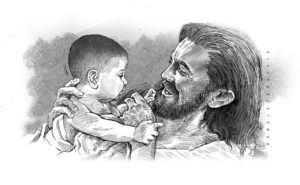
Those who find the spiritual life restrictive can find instruction in George Herbert’s poem, “The Collar.”
The poem begins on a note of rebellion.
The speaker has lived a life of piety, of faithful observance of the commandments and the counsels of God.
He contemplates his freedom (“My lines and life are free; free as the rode, / Loose as the winde, as large as store”), and finds that his devotion to God has brought him “no harvest but a thorn.”
And so he decides to turn his back on the godly life, saying, “I struck the board, and cry’d, No more. / I will abroad.” (“Board” suggests altar – Herbert was an Anglican priest.)
He wants to go his way.
It was as though he had lived inside a cage, and the restrictions on his life were nothing but a “rope of sands.”
His defiant heart tells him that he could still find excitement and have a delightful time, if only he would apply himself with even greater vigor to
indulgence.
But at the height of his defiance, as he “rav’d and grew more fierce and wilde / At every word,” he hears a voice within himself – “Me thoughts I heard one calling / Childe: / And I reply’d, My Lord.”
That was all he heard – a still, small voice calling him, “Child.”
And from his reply, “My Lord,” we can deduce that all his bitterness disappeared, and he stopped grumbling.
Now he sees his relationship with God in the rightful light, as that of a child in an intimate relationship with the Lord.
All this brings to mind a passage from Mark, in which Jesus put his arms around a child and said to his disciples, “Whoever receives one child such as this in my name, receives me; and whoever receives me, receives not me but the one who sent me.”
Of our status as children of God, Paul repeatedly reminds us, “The Spirit itself bears witness with our spirit that we are children of God…”
“So, be imitators of God, as beloved children.”
“So you are no longer a slave but a child, and if a child then also an heir, through God.”
The title of the poem, “The Collar,” is rich in meanings. It could refer to the clerical collar, or the slave’s collar, or even a dog’s collar (because the speaker is behaving more out of animal passion than rationality).
At the same time, “collar” sounds like “choler” and “caller.”
There is choler or anger in the speaker’s rebelliousness.
One commentator wrote: “Until the speaker recognizes the inner call of ‘Child,’ he remains bitter, angry, rebellious and choleric; but once he comes to understand what ‘child’ means in biblical terms, he redefines his relationship to God, who is calling him to a life of service and obedience, and wholeheartedly responds, ‘My Lord,’ to show his complete submission to God and his willingness to accept all that is implied by that submission.”
A story is told of an African who had to wear a collar because he was a slave.
When he became free, he removed the collar.
But then he became a Christian, and he put the collar back on, willingly, because he no longer had the status of a slave, but of a favored servant, and more than that, a child of God, called to share in God’s life.